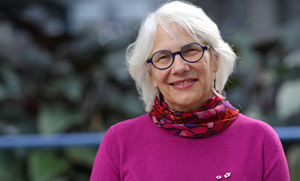If you could ensure your baby was born free of disease by making genetic changes to your embryos, would you? What if there was a chance that the gene-editing necessary could have profound unforeseen effects on future generations ÔÇö your grandchildren or great-grandchildren?
These questions, once thought the dominion of science fiction, are becoming thorny issues humanity needs to deal with ÔÇö and quickly. In fact, decisions are already being made. In 2018, scientist He Jiankui, a researcher at the Southern University of Science and Technology in China, claimed to have produced the worldÔÇÖs first genome-edited babies using CRISPR technology ÔÇö twin girls born resistant to HIV.
 Thursday (February 17), ║┌┴¤│ď╣¤═°bioethicist (shown right) joined fellow leading scholars for a virtual debate on whether CRISPR should be used to create babies preprogramed to receive biological enhancements or avoid genetic disease. She will take the side against. Arguing for was Dr. George Church, a professor of genetics at Harvard and MIT who developed the first direct genomic sequencing method and whose research on pig genome engineering helped make possible the recent successful transplant of a genetically modified pig heart into the chest of a man from the State of Maryland.
Thursday (February 17), ║┌┴¤│ď╣¤═°bioethicist (shown right) joined fellow leading scholars for a virtual debate on whether CRISPR should be used to create babies preprogramed to receive biological enhancements or avoid genetic disease. She will take the side against. Arguing for was Dr. George Church, a professor of genetics at Harvard and MIT who developed the first direct genomic sequencing method and whose research on pig genome engineering helped make possible the recent successful transplant of a genetically modified pig heart into the chest of a man from the State of Maryland.
Dr. Baylis was joined on the against side by Marcy Darnovsky, policy advocate and executive director at the , one of the worldÔÇÖs most prominent voices on the politics of human biotechnology. Joining Dr. Church was Amy Webb author of ÔÇťThe Genesis Machine" and founder and CEO of the , who was named by Forbes as one of five women changing the world.
The debate, hosted by , aired across National Public Radio stations across the United States and to more than 1 million podcast subscribers. Viewers were also able to watch the debate online for free on February 17 at 6 p.m. Atlantic time by .
In advance of the debate, University Research Professor Dr. Baylis, who is author of the book , provided some context to the discussion.
Do you foresee ways that genetic engineering could permanently change our society?
There are many ways in which widespread use of genome-editing technology could change the world. A potential positive effect could be the availability of one-and-done genetic therapies for individuals with serious genetic disorders. A potential negative effect is increased intolerance for diversity as an increasing number of traits come to be seen as imperfections to be corrected.
There is already unequal access to health care to varying degrees around the world. How might gene editing exacerbate or improve this issue?
Many worry that human genome-editing technology will only (or primarily) be available to people with considerable resources living in high-income countries. If this proves to be the case, there is the very real risk that this technology will further exacerbate the growing gap between the ÔÇťhavesÔÇŁ and the ÔÇťhave nots.ÔÇŁ╠ř This worry is especially acute if we imagine a future in which heritable human genome-editing results in the creation of a genetic underclass.
I worry about the ways in which existing social inequities and health inequalities among people with disabilities, people of particular racial or ethnic groups, people of lower castes, and eventually everyone would be exacerbated as those with power, privilege, and money would be better able than others to avail themselves of health-related (and non-health-related) advantages that would come with heritable human-genome editing.
Where should we draw the line?
Line drawing is a value-laden exercise ÔÇö who decides where to draw the line? I have long argued that the decisions to be made are too important to be left to the scientific community alone. Instead, we should be looking to develop broad societal consensus on the ways in which this technology might be used in pursuit of the common good. There is wide agreement on the net positive value of developing genetic therapies for patients who are suffering. In sharp contrast, there are serious worries about the ways in which heritable human-genome editing could be harmful to the women who participate in the research, to the prospective parents, to the genetically modified children, to society and to future generations.
╠ř

